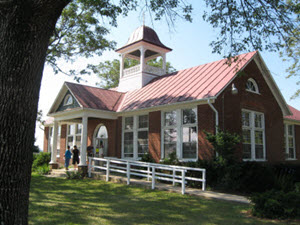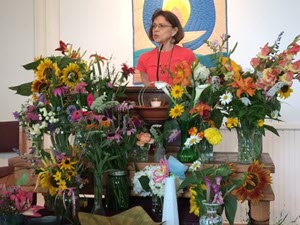
HUU Sermon Archives
Agape (Spiritual Love) and Social Justice
By Christine Robinson
Date: February 6, 2005
Good morning, Good People.
This morning I would like to talk about what the Ancient Greeks and later Christians called agape, spiritual love, and its place in the practice of social justice.
What I love the most about Unitarian Universalism, and this congregation, is our commitment to social justice embodied in our sixth principle: “The goal of world community with peace, liberty, and justice for all people.”
If I may loosely borrow from Tina Turner: what’s spiritual love got to do with it (social justice)? In my view, absolutely everything.
Part I. Agape as Spiritual Love
The ancient Greeks wrote endlessly about love, though they rarely used the word agape. Greek has at least four words for love: eros, or romantic love; philia, the love between friends; storge, or familial love; and agape, spiritual love.
Love in its various forms has attracted both believers and critics:
Among love’s detractors:
Plato, who called eros “divine madness.”
Schopenhaur, said love is “nature’s greatest deception” played on us in order to preserve the species.
For Erich Fromm, love is a coping mechanism to counter the pain of one’s separateness and existential isolation.
For Freud, love is a form of psychopathology – all love is essentially an irrational aberration.
Although I am a critic of many of the messages in our culture about love; I am a true believer in the power to transform our spirits and our society.
Part II. Love has a long list of believers:
Agape in the Christian tradition manifests as unconditional love, such as the love exhibited in the life of Jesus. Jesus commanded his followers “Love one another as I have loved you.”
In 1 Corinthians 13, the chapter on love in the Christian scriptures, the qualities of spiritual love are defined: “Agape is patient. Agape is kind and is not jealous. Agape does not seek its own, is not provoked, does not take into account a wrong suffered, does not rejoice with unrighteousness, but rejoices with the truth, bears all wrongs, believes all things, hopes all things, endures all things, agape never fails.”
Martin Luther King, one of the greatest practitioners of social justice, was an apostle of spiritual love. Agape was the basis of King’s philosophy of social justice.
As King appropriated it from the Christian tradition, agape means goodwill for all human beings. It is an abundant, overflowing love that seeks nothing in return. It is love not attached to self-interest or ego. Agape, for King, has nothing to do with whether or not we like our fellow human beings, and is not to be confused with sentimentality. When we love others at this level, we love people not because we like them, but because we believe in the inherent worth and dignity of every person (UU principle #1), and because we seek a “world community with peace, liberty, and justice” (UU Principle #6) for everyone, what King called the “beloved community.”
Though spiritual love is not the same as sentimentality, it is, in part, a condition of the heart, and as well as a quality of mind and spirit. Above all, agape is a practice, a way of being in the world, and, at its best, a way of life.
King was an apostle of love. He was also an apostle of action, reminding us of “the fierce urgency of now.” For King, social justice requires both love and a disciplined mind. In his sermon titled “Love in Action” King preached that “one day we will learn that the heart can never be totally right if the head is totally wrong… only through bringing together head and heart, intelligence and goodness – shall man rise to a fulfillment of his human nature.”
King believed and practiced relentless nonviolent resistance, the method of social action developed by Mahatma Gandhi. King modified Gandhi’s method, arguing that “at the center of nonviolence stands the principle of love.” A commitment to nonviolence requires not only avoiding external physical violence but also internal violence of the spirit, which can only be accomplished, according to King, by “projecting the ethics of love to the center of our lives.”
Part III. How do we practice agape in the service of social justice?
Both Gandhi and King advocated that first we must develop and transform our inner lives. Gandhi called this satyagraha (truth-force or soul-force) – we must discipline and develop our spiritual selves if we are to transform society.
King believed that love was the regulating idea behind satyagraha.
Many of us have been deeply wounded by religion, and have chosen to reject religion before it wounded us any deeper. Too many of us have abandoned our spiritual journeys altogether because we were once abandoned by our churches, synagogues, and temples.
Many of us who are Unitarian Universalists are refugees-- or immigrants, if you prefer -- from other spiritual traditions. Many of us can relate to the temptation to reject spirituality because of what we experienced in other places of worship.
There is an inner suffering that many of us struggle with as a result of, what Reverend Jimmie Creech first called “spiritual violence.” This kind of violence causes grave suffering, and is as important to confront as physical violence. The suffering it causes prevents many of us from loving ourselves and each other. It is this kind of violence that enables self-hatred to take root and fester in us like a cancer that eats away at our human spirit and eventually cripples our souls. It is the kind of suffering that causes people to live in the shadows of society, and, too often, to take their own lives. It is the kind of suffering that causes the silent inner wars that crowd our hearts and exhaust our souls. People all around us are suffering from the effects of spiritual violence.
How convinced are we that something must be done to end it?
In South Africa and India, Gandhi wanted to end British rule, but he was even more concerned about restoring the souls of his people ground down by their oppression. After centuries of being dehumanized and demeaned by the upper classes, Gandhi reminded the “Untouchables” that they were God’s children too. They weren’t subhuman, inferior, or punished by God for their sinfulness in this life or another. Gandhi was also concerned about restoring the souls of the British, which were damaged by oppressing others.
Gandhi helped the outcasts of his society believe that they were loved, which helped free the hearts and minds of the “Untouchables” themselves, long before the laws and customs changed.
In the US, Dr. King was determined to see segregation end, but he was even more determined to renew the broken spirits of its victims, black and segregationist alike. In sermon after sermon, Dr. King reminded the outcasts of his time, the black victims of slavery and segregation, that they, too, were God’s children, endowed by their Creator with certain unalienable rights, among them “life, liberty, and the pursuit of happiness.”
If we are to take the transformative power of love seriously, and clearly, I do, we must first think about our own spirits, our own souls. We must ask ourselves:
How has spiritual violence wounded us?
What have we done, and what are we doing, to heal or renew our own souls?
Although you might not like the idea of dividing yourself into body, mind, and spirit, indulge me for a moment. How would you compare the health of your soul to the health of your body or the health of your intellect right now?
Part IV: The Difficult Path
There’s a reason that King titled one of his books Strength to Love. It is the same reason that Gandhi said “Love is the prerogative of the brave.” Love is a difficult path. It is so much easier to respond to hate with hate, to lies with clever, angry sound bites, to ignorance with sarcasm and derision, to injustice with cynicism and hopelessness. To love requires courage and self-discipline.
There are many reasons to choose the difficult path, perhaps first among them is that “Hate is just as injurious to the person who hates.”
Second, love has an amazing quality: it is one of the few things in life that generates more of itself by giving it away. But that is precisely what love and hate have in common, which is why I believe in loving our adversaries. King sought to oppose an unjust system and love the perpetrators of the system.
Love is a difficult path also because loving those with whom we disagree will anger both our adversaries and our friends. King wrote his famous letter from Birmingham Jail to his loudest critics, the Christian and Jewish clergy of Alabama. Gandhi was killed by a fellow Hindu who thought him “pious” and “naïve” about Muslims. Our friends are confused when we love our adversaries. They will call us cowards, and much worse. Our adversaries are baffled when we love them because they have no way to defend against it. So, we get abuse from both sides when we choose this difficult path.
That is why Gandhi and King insisted that we prepare our souls for the struggle before we even begin to practice non-violence as a method of social justice.
There is a third reason why I believe that learning to love ourselves according to the qualities of agape is so important. I believe the more we restore our spirits and love ourselves, the less willing we are to adjust to everyday injustices and spiritual violence.
The word “justice” means “to be in accordance with what is right.” When we adjust - “ad,” from the Latin prefix meaning “to turn away from” and, “just,” what is right – we cooperate with injustice, which eventually will kill us, spiritually and literally.
I want to illustrate this by sharing a story from feminist Sonia Johnson. (Pg. 234-5 of Going Out of Our Minds: The Metaphysics of Liberation)
Sonia Johnson writes:
“I remembered a story I’d heard once long ago about an experiment with frogs. There was once an inhumane but well-intentioned biology teacher who brought two frogs and two tin cans to class one day. With all eyes upon him, he filled one can with water, dropped a frog into it, and put the can on a hot plate. Little by little, the water heated up. Little by little, the frog adjusted to the increase in temperature. Adjusted, that is, until the water boiled, at which point it couldn’t adjust any longer and died before the horrified eyes of a roomful of teenagers. Then the teacher took the other can, filled it with water, and put it on the burner. As the water began to boil, he tossed the other frog into the can. The frog, who was no fool, instantly leapt out of the can….
Little by little, imperceptibly, we adjust to increasingly deadly conditions, and come to accept them as “natural” or inevitable…
Little by little, we adjust to having freedoms stolen away from us, to having fewer and fewer choices, less and less voice in the decisions that affect our lives…
Little by little, we come to believe we cannot do anything about all this…
Little by little the water heats up, and because we are one of the most adaptable species on earth, we keep adapting to new and ever more dangerous conditions and ideas. What should seem horrendous comes to seem normal…
We forget because the change is gradual…. But as with the first frog, the water is heating up around us.”
Part V. Final Thoughts:
Don’t believe the lies in our culture that love is the soft way. Love is far stronger than ignorance and hatred. I have been transformed the most when I dared to open my heart. “The world moves for love. It kneels before love in awe.”
Don’t believe the lie that turning inward spiritually must come at the expense of engaging the world. For me, a deep spirituality does not take me away from the world; it helps me to more effectively and justly engage the world.
Both Mahatma Gandhi and Martin Luther King were optimists. So am I. I believe that our “strength to love” ourselves, then in the service of social justice, has the best chance of bringing a truly Beloved Community to earth.
For the latest sermons and events at HUU, visit our Community Cafe.
Inclement
Weather Policy
Worship
Service Materials


UUs on YouTube
Our denomination has an official presence on YouTube! The Unitarian Universalist Association's YouTube site includes several videos and lots of interesting commentary.
Harrisonburg Unitarian Universalists 4101 Rawley Pike | Harrisonburg,
VA 22801
Mailing Address: | PO Box 96 | Harrisonburg, VA 22803
| (540) 867-0073 | Webmaster
HUU is a member of the Southern
Region of the Unitarian Universalist
Association
Privacy Policy &
Disclaimer
Site Design & Maintainence : Expression
Web Tutorials & Templates


